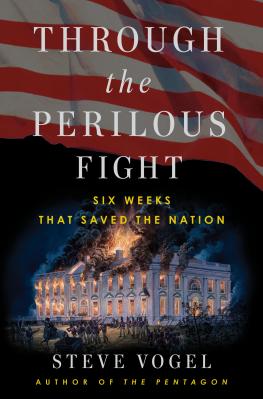The flag was still there, over Fort McHenry in Baltimore harbor, 1814.
Steve Vogel takes on a critical month-and-a-half in U.S. history that he argues saved the United States. In Through the Perilous Fight: Six Weeks that Saved the Nation, out this week, the Washington Post military reporter dives deep in the summer of 1814. It was a momentus time, he argues, when the 40-year old nation preserved itself despite grave danger, cut itself free from its colonial past, and gave birth to The Star-Spangled Banner.
Two hundred years ago, the British responded to a U.S. declaration of war against it by attacking Washington and leaving the Capitol and White House blackened ruins. But when the British tried to deliver a knockout blow three weeks later in the nearby port city of Baltimore, America got its second wind and turned back the enemy attack. Battleland conducted this email chat with Vogel, who also has written a fine history of the Pentagon building itself, last week:
How did the six weeks you write about save the nation?
Picture the scene in Washington on August 26, 1814, the morning after the British withdrew from the captured capital. The country’s great landmarks, including the Capitol and the White House, were smoldering shells.
Every vestige of American leadership, power, or authority had vanished. The American army had abandoned the capital. President Madison and his cabinet had fled, and nobody in Washington knew where they were.
One powerful British force was still in the Chesapeake region, threatening to lay waste to cities up and down the east coast. Another was assembling in Canada with plans to invade New York and cut New England off from the rest of the nation.
In Ghent, at the same time Washington was burning, British ministers presented an American delegation with what amounted to conquerors demands, including the creation of a permanent, 250,000-square-mile Indian buffer state encompassing most of present-day Indiana, Illinois, Wisconsin, and Michigan, plus much of Ohio and Minnesota.
The British also wanted military control of the Great Lakes and navigation rights on the Mississippi, terms that would have essentially neutered American power on the North American continent.
It’s hard to think of many more destitute moments in American history.
Yet in the space of a few weeks, the situation was reversed.
At the same time the British were repulsed at Baltimore, the Americans turned back the invading British force in New York.
These American victories completely changed the dynamics at Ghent. They forced the British to reconsider whether it was worth waging this expensive war. It allowed the U.S to emerge from Ghent with far better terms than could have been expected, setting the stage for the Monroe Doctrine and the westward expansion.
What are the key facts about this episode that most Americans don’t know?
Everybody knows little bits and pieces of this history: Dolley Madison saving the portrait of George Washington from the White House, Francis Scott Key witnessing the bombardment of Fort McHenry, Andrew Jackson winning a stunning victory in New Orleans.
But most people know little about the characters involved or the dramatic sequence of events that make this such a compelling story.
One of the great ironies is that Key, author of this most patriotic of all American songs, was a passionate opponent of the war – so much so that he was hoping the U.S. invasions of Canada would end in failure. Yet he joins in the botched defense of Washington, embarks on an improbable mission to gain freedom for an elderly doctor taken prisoner by the British, and ends up being detained himself and witnesses the bombardment.
The forgotten figure in this story is the man behind the capture of Washington, British Rear Admiral George Cockburn, one of the most ruthless and resourceful foes the nation would ever face on its own soil.
Two centuries ago, commanding a British naval squadron that terrorized the Chesapeake, Cockburn was the most hated man in America, and the most feared. He was determined to make the U.S. pay a hard price for its war with England, and he nearly succeeded.
Any parallels between those six weeks and the U.S. today? If so, kindly elaborate.
Two hundred years ago, the country was broke, the government dysfunctional, and the nation badly divided on partisan lines.
Congress and the administration had refused to raise taxes to pay for the war, and the Treasury was nearly out of money. War proponents had promised Canadians would greet the invading Americans as liberators, but it didn’t turn out that way.
Political discourse in Congress, in newspapers and in the nation itself, was absolutely vitriolic. Francis Scott Key lamented to his friend John Randolph that “the state of society is radically vicious.”
Does any of this sound familiar?
How alike were the attack on the White House and the attack on the Pentagon and World Trade Center?
The attacks themselves could hardly be more different.
The 9/11 attack was an act of terrorism that took the country by total surprise.
The capture of Washington was more like a disaster unfolding in slow motion.
In the spring of 1814, the British loaded an army of invasion onto ships and sent them across the ocean to end this festering war with America. We knew they were coming, we knew they were ticked off, we knew Washington was a possible target.
Yet when they landed in Maryland and started moving toward the capital, our political and military leadership was paralyzed, and we squandered opportunities to stop them.
Where 9/11 and the capture of Washington are similar is in the response they generated around the country. The burning of the capital was a shock to Americans, and it galvanized the nation in a manner not unlike that seen after 9/11 and Pearl Harbor.
Why is the War of 1812 seemingly a black hole in American history? Should it remain one?
Ironically, the war loomed very large in the American consciousness for many years.
It was seen in the years that followed as an event that established both an American sovereignty and a sense of union that hadn’t existed before the war. Some considered it a second War of Independence.
It wasn’t known then as the War of 1812, which incidentally is a spectacularly bad name for a war that lasted nearly three years. Of course the war was superseded by the Civil War, the great colossus of American history, and over time, 1812 receded in our collective memory.
The War of 1812 should be remembered for what it is: a critical moment in the young nation’s development, a turning point where the country’s history could easily gone in a different, less bright direction.
Should The Star-Spangled Banner be the national anthem?
Francis Scott Key captured a unique moment in American history.
It’s essential to remember that the first verse everybody sings at baseball games is really one long question, ultimately wondering not just whether the flag was still flying, but whether the republic would survive. Key wasn’t at all sure at that moment that it would.
His eyewitness description of the American flag flying over Fort McHenry in Baltimore harbor after the tremendous British bombardment created an indelible image for a nation shaken by the fall of Washington.
John Philip Sousa, the great Marine bandleader and composer who knew a thing or two about anthems, probably said it best: “Nations will seldom obtain good national anthems by offering prizes for them. The man and the occasion must meet.”
I have to say my blood boils when I hear people say we should get rid of The Star-Spangled Banner because it’s too hard to sing.
Why the heck shouldn’t it be hard to sing?
Can you sing it?
Yes, but you don’t want to hear me.




